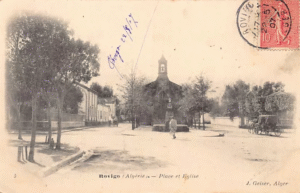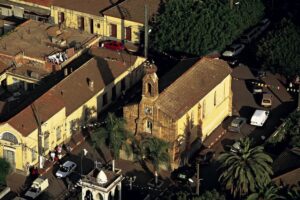Bougara Church: A Forgotten Jewel of Blida’s Heritage


In the peaceful town of Bougara, not far from the heart of Blida, stands a silent witness to time — Bougara Church. Although it no longer echoes with hymns, this historic monument continues to tell the story of faith, architecture, and cultural exchange that once defined the region.
A Journey Back in Time
Built during the French colonial period, the church of Bougara was designed to serve the growing European community that once lived in the area. Its construction likely dates back to the late 19th or early 20th century, when Bougara—then called Rovigo—was a small but important agricultural hub. Over time, the church became a spiritual and social center, where masses, baptisms, and local gatherings marked the rhythm of daily life.
Even after independence, the church continued to stand proudly, silently carrying memories of an era that shaped the town’s identity. Today, although it no longer functions as a place of worship, it remains a remarkable heritage site, representing both colonial architecture and the story of coexistence between cultures.
Architecture That Tells a Story
At first glance, the church’s architecture captures attention with its Romanesque influence—arched windows, solid stone walls, and a small bell tower reaching toward the sky. The façade, though aged by time, still preserves traces of delicate craftsmanship. Inside, light once filtered through stained glass, creating a peaceful atmosphere that contrasted with the bustling life outside.
Despite the passing years, the structure stands strong, proving the durability of materials and design choices typical of colonial constructions in Blida. This mixture of strength and simplicity gives the building its unique charm.
A Quiet Symbol of Memory
Walking near the church today feels like opening a forgotten book. Its surroundings have changed, yet the silence of its walls speaks louder than ever. Local residents often recall stories their grandparents told—of weddings, Christmas masses, and community gatherings that once filled this sacred space.
In a way, the church has become a bridge between generations, reminding Bougara’s people of their city’s layered identity. Though it’s no longer active, its value lies in what it represents: a living testimony of faith, history, and endurance.
Discovering Bougara’s Hidden Heritage
For travelers exploring Blida, stopping by the church in Bougara offers more than just a historical visit. It’s an invitation to feel the calm energy of a place untouched by modern noise. Surrounded by the town’s green landscapes and the scent of olive trees, it’s easy to imagine the past echoing through every stone.The site may not be officially listed as a monument yet, but it deserves recognition and preservation as part of Algeria’s broader cultural heritage. Visiting it is not just about seeing a building—it’s about rediscovering a chapter of Bougara’s soul.